
-
Find the right food for your petTake this quiz to see which food may be the best for your furry friend.Find the right food for your petTake this quiz to see which food may be the best for your furry friend.Featured products
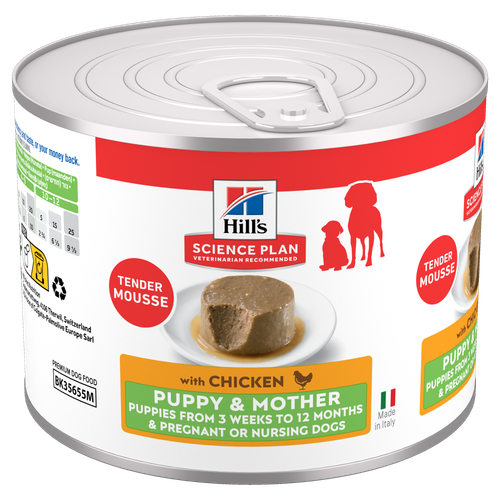 Puppy & Mother Tender Mousse Dog Food
Puppy & Mother Tender Mousse Dog FoodHill's Science Plan Puppy & Mother Tender Mousse Dog Food with Chicken is a complete premium pet food for puppies and pregnant or nursing dogs. Formulated with chicken and other specially selected ingredients, including minerals and antioxidants to support gut health and optimal growth, it comes in a soft mousse texture they'll love.
Shop Now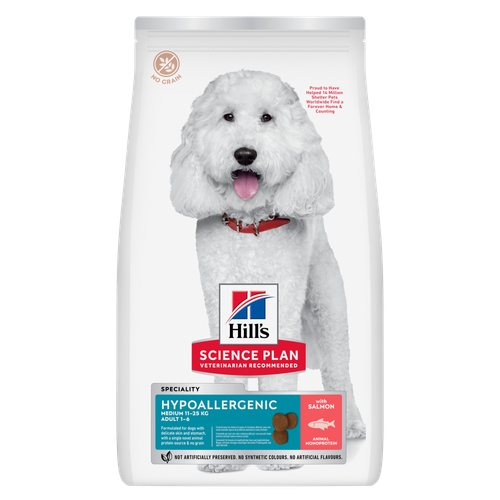 Hypoallergenic Medium Adult Dog Food
Hypoallergenic Medium Adult Dog FoodScience Plan Hypoallergenic Medium Adult dog food with Salmon is a gentle, science-led formula crafted for dogs with food sensitivities. Made with carefully selected, high-quality novel proteins and no grains, it’s tailored to minimise common triggers that can lead to skin and digestive discomfort.
Shop Now Perfect Weight Small & Mini Adult Dog Food
Perfect Weight Small & Mini Adult Dog FoodHill's Science Plan Adult Small & Mini Dog Food with Turkey is a complete premium pet food for adult small dogs from 1 year old that are prone to weight gain or slightly overweight. This deliciously smooth mousse is formulated to deliver the appropriate amount of energy to support weight maintenance in adult dogs.
Shop NowFeatured products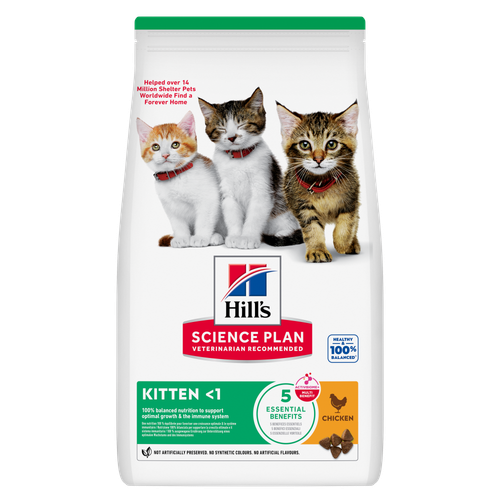 Kitten Food
Kitten FoodHill's Science Plan Sterilised Kitten Cat Food with Chicken is specially formulated with ActivBiome+ Multi-Benefit Technology. This food is carefully formulated for the developmental needs of kittens, so they get the best start in life & grow to their full potential.
Shop Now Hypoallergenic Dry Cat Food
Hypoallergenic Dry Cat FoodHILL'S SCIENCE PLAN Hypoallergenic Adult cat food with egg & insect protein is a complete pet food for adult cat 1–6 years old. It's formulated for cats with delicate skin and stomach, with limited high quality novel protein sources & no grain.
Shop Now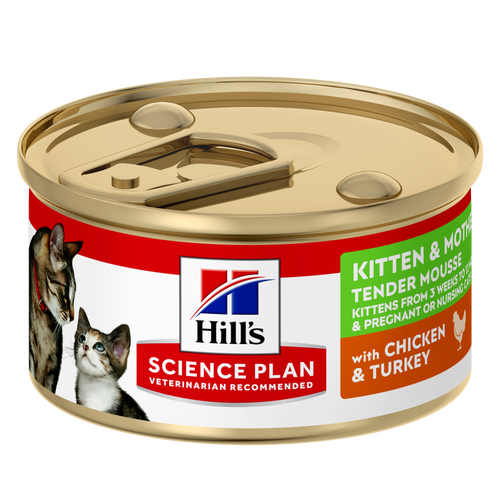 Kitten & Mother Tender Mousse Cat Food
Kitten & Mother Tender Mousse Cat FoodHill's Science Plan Kitten & Mother Tender Mousse Cat Food with Chicken & Turkey is a complete premium pet food for kittens from weaning until 1 year old and for pregnant and nursing cats. Formulated with chicken, turkey and other specially selected ingredients to support gut health and optimal growth. It comes in a soft mousse texture they'll love.
Shop Now -
Dog
- Dog Tips & Articles
-
Health Category
- Weight
- Food & Environmental Sensitivities
- Urinary
- Digestive
- Joint
- Kidney
-
Life Stage
- Puppy Nutrition
- Adult Nutrition
- Senior Nutrition
Cat- Cat Tips & Articles
-
Health Category
- Weight
- Skin & Food Sensitivities
- Urinary
- Digestive
- Kidney
-
Life Stage
- Kitten Nutrition
- Adult Nutrition
Featured articlesTips for Working From Home With a PetGet helpful information on how to get all of your work done while keeping your dog or cat entertained when working from home.
Read More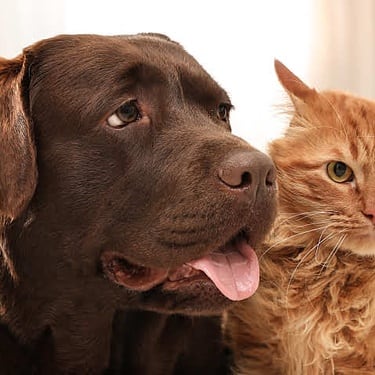 What Cleaning Products Are Safe for Pets?
What Cleaning Products Are Safe for Pets?Learn which cleaning product ingredients can be hazardous for dogs & cats, which alternatives are safer and tips for using cleaning products around pets.
Read More Tips For Mixing Wet And Dry Pet Food
Tips For Mixing Wet And Dry Pet FoodDiscover tips for mixing wet and dry pet food to ensure balanced nutrition and variety for your pet. For comprehensive feeding advice, visit Hill's Pet UK.
Read More -


When it comes to your cat, you want to make sure she has the best kind of cat food for her nutritional needs. From time to time, you may be tempted to give her table scraps and special treats, but bear in mind that certain foods can be poisonous to her. Here’s a look at some of the most toxic foods for cats.
Onions and Garlic
Onions, garlic, shallots, and scallions can cause damage to your cat’s red blood cells and lead to anemia. These foods are typically poisonous when eaten in large quantities, but exposure to concentrated forms of onion or garlic, such as onion soup mix or garlic powder, can also be toxic. Cats with symptoms of lethargy, weakness, reduced appetite, pale gums, and orange to dark red urine should be taken to the vet immediately.
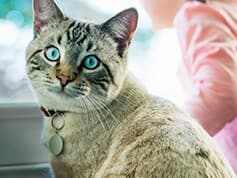
Raw Eggs, Raw Meat & Bones
Just like humans, consumption of raw eggs or raw meat can lead to salmonella or E. coli poisoning in cats. Symptoms of the illness vary but can include vomiting, diarrhea, and lethargy. Salmonella and E. coli can also be transmitted to humans, so be careful to properly wash your hands after cooking and keep your cat away from these raw foods. Raw eggs also contain an enzyme that can lead to skin and coat problems. Keep your cat from eating raw bones as well—she could choke on them, injure her digestive tract, or damage her teeth.
Chocolate and Caffeinated Drinks
We’ve all heard that chocolate can be fatal to dogs, but it’s just as poisonous for cats as well. Chocolate contains substances called methylxanthines, which can cause vomiting and diarrhea, high body temperature, muscle tremors, abnormal heart rhythm, abdominal discomfort, increased thirst, and seizures. Methylxanthines are also found in caffeinated beverages and should be avoided. See your vet if your cat experiences any of these symptoms. As a general rule of thumb, darker chocolates are more dangerous than milk and white chocolate.
Alcohol and Raw Dough
Alcoholic beverages and foods that contain alcohol can be dangerous for your cat. Ingestion can cause vomiting, diarrhea, tremors, disorientation, trouble breathing, coma, and even death. It’s also important to keep your cat away from raw dough. Raw dough causes expansion in the stomach, or creates alcohol in the stomach. If you think your cat has ingested even a small amount of alcohol, take her to the vet immediately.


Tasty Tips
Milk and Dairy Products
Even though your cat may enjoy drinking milk, it isn’t necessarily good for her. Cats have trouble digesting the lactose in milk, which can cause an upset stomach or diarrhea. Most cats are only exposed to lactose from their mother's milk when they are kittens. Because kittens only drink from their mother’s milk for a few weeks, their digestive systems are often not equipped to handle a reintroduction to lactose. So, while some cats have no trouble tolerating milk, they are not recommended to drink anything but their mother’s milk while kittens, due to the possibility of digestive issues.
Grapes and Raisins
Even a small amount of grapes and raisins can cause your cat to become ill — they can even lead to rapid development of kidney failure. Within 12 hours of ingestion, vomiting sometimes occurs. Other signs that can show up within 24 hours include lethargy, diarrhea, reduced appetite, abdominal pain, decreased urination and abdominal pain.
Although it isn't clear why, grapes and raisins can cause kidney failure in cats, and even a small amount can make a cat ill. Repeated vomiting and hyperactivity are early signs. Although some cats show no ill effects, it's best not to give your cat any grapes and to keep grapes and raisins off countertops and other places accessible to your cat.
Dog Food
Though dog food is not toxic to cats, your cat needs a very different set of nutrients than a dog. Cat food should contain plenty of vitamin A, taurine, arachidonic acid and protein, and dog food has much lower levels of these nutrients. Dogs can survive with lower levels of vitamin A and protein, while cats cannot. Dogs are also able to produce taurine and arachidonic acid, but cats must have these acids in their food. Without a sufficient amount of taurine, cats can develop heart disease, vision and dental issues.
Preventing Cats from Eating Dangerous Foods
Your cat’s life and well-being depend on the type of food she eats. By keeping poisonous and hazardous foods out of her reach, as well as making sure she consumes a balanced food, you are helping her stay healthy.
Here are some easy tips for preventing your cat from eating dangerous and toxic foods:
- Store foods out of your cat’s reach. Installing cat-proof locks on cabinets may be necessary for a curious kitty.
- Do not let your cat on the counter while you’re cooking or eating.
- Do not feed her table scraps.
- It is especially important to be more mindful during the holidays. There is likely more enticing people food around, much of which can upset your cat’s tummy or even harm her.
If you notice or suspect that your cat has eaten one of these foods, take her to your veterinarian immediately. While some of these foods may only cause your cat slight discomfort, others can be far more hazardous to her health. If in doubt, ask your vet for guidance.


One of our staff authors prepared this article for you
Related products

HILL'S SCIENCE PLAN Hypoallergenic Adult cat food with egg & insect protein is a complete pet food for adult cat 1–6 years old. It's formulated for cats with delicate skin and stomach, with limited high quality novel protein sources & no grain.

Hill's Science Plan Kitten & Mother Tender Mousse Cat Food with Chicken & Turkey is a complete premium pet food for kittens from weaning until 1 year old and for pregnant and nursing cats. Formulated with chicken, turkey and other specially selected ingredients to support gut health and optimal growth. It comes in a soft mousse texture they'll love.

Hill's Science Plan Oral Care Adult Cat Food with Chicken contains clinically proven kibble technology to reduce plaque & tartar build up.
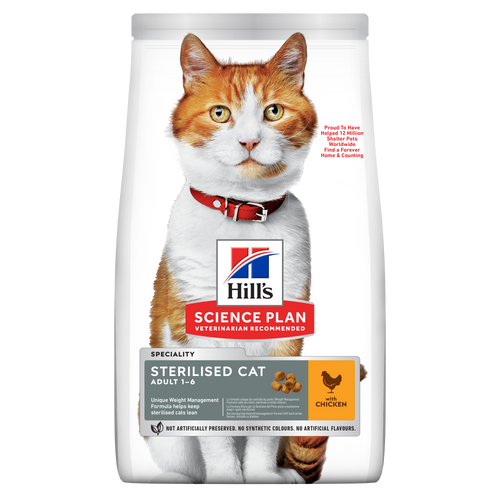
Hill's Science Plan Adult Sterilised Cat Dry Food with Chicken is specially formulated with ActivBiome+ Multi-Benefit Technology. It is a precisely balanced nutrition, tailored to meet the needs of sterilised cats, to help keep sthem lean & healthy.
Related articles
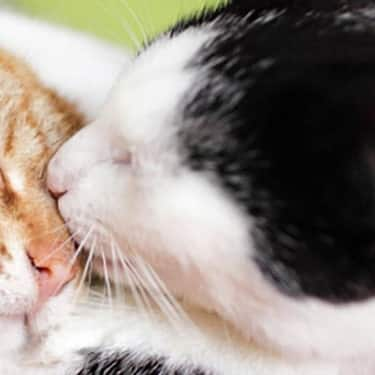
Learn the different factors that might be contributing to your cat's weight gain, and how bigger doesn't always mean better.
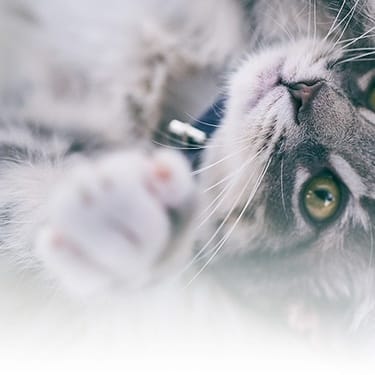
South African vets say more than half the patients they see are overweight. Learn more about managing your cat’s weight.
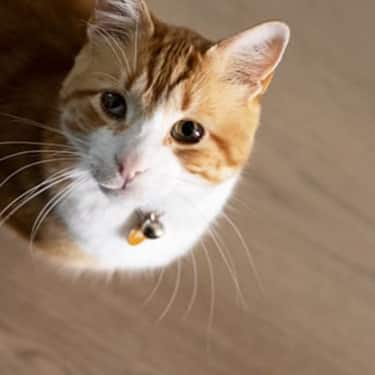
Learn how to spot the signs of a skin condition in your cat and the steps to take for their wellbeing. For comprehensive care advice, visit Hill's Pet.
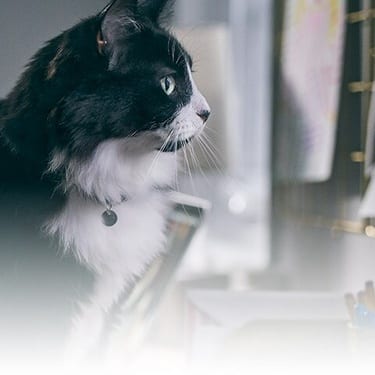
While hairballs are a common occurrence of cats, there are steps you can take to help them manage their problem and keep them healthy.

Put your cat on a diet without them knowing
Our low calorie formula helps you control your cat's weight. It's packed with high-quality protein for building lean muscles, and made with purposeful ingredients for a flavorful, nutritious meal. Clinically proven antioxidants, Vitamin C+E, help promote a healthy immune system.
Put your cat on a diet without them knowing
Our low calorie formula helps you control your cat's weight. It's packed with high-quality protein for building lean muscles, and made with purposeful ingredients for a flavorful, nutritious meal. Clinically proven antioxidants, Vitamin C+E, help promote a healthy immune system.

